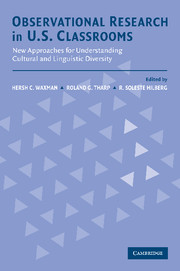 Observational Research in U.S. Classrooms
Observational Research in U.S. Classrooms Published online by Cambridge University Press: 23 November 2009
The Standards Performance Continuum (SPC) is a 5-point rubric that provides a quantitative measure of classroom enactments of the Standards for Effective Pedagogy. The first standard, Joint Productive Activity, involves teachers and students working together on a common product or goal, with opportunities to converse about their work. The second standard, Language and Literacy Development, involves developing competence in the language and literacy of instruction and in the academic disciplines throughout all instructional activities. The third standard, Contextualization, situates new academic content in contexts familiar to students to connect it to prior knowledge or experience from the home, school, or community. The fourth standard, Challenging Activities, uses complex tasks requiring the application or use of content knowledge to achieve an academic goal. The fifth standard, Instructional Conversation, is a planned, goal-directed conversation between a teacher and a small group of students. Tharp, Estrada, Dalton, and Yamauchi (2000) proposed these standards as the most effective strategies for teaching culturally, linguistically, and economically diverse students who are less successful in school, but they also stress their importance for all learners.
There is growing evidence of the effectiveness of classroom implementations of these standards. For example, Padrón and Waxman (1999) found that in fourth- and fifth-grade classrooms with largely Latino English language learners (ELLs) where the standards were used to a moderate degree, students perceived themselves as more capable readers, perceived more cohesion in the classroom, and spent slightly to moderately more time on task.
To save this book to your Kindle, first ensure [email protected] is added to your Approved Personal Document E-mail List under your Personal Document Settings on the Manage Your Content and Devices page of your Amazon account. Then enter the ‘name’ part of your Kindle email address below. Find out more about saving to your Kindle.
Note you can select to save to either the @free.kindle.com or @kindle.com variations. ‘@free.kindle.com’ emails are free but can only be saved to your device when it is connected to wi-fi. ‘@kindle.com’ emails can be delivered even when you are not connected to wi-fi, but note that service fees apply.
Find out more about the Kindle Personal Document Service.
To save content items to your account, please confirm that you agree to abide by our usage policies. If this is the first time you use this feature, you will be asked to authorise Cambridge Core to connect with your account. Find out more about saving content to Dropbox.
To save content items to your account, please confirm that you agree to abide by our usage policies. If this is the first time you use this feature, you will be asked to authorise Cambridge Core to connect with your account. Find out more about saving content to Google Drive.